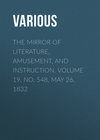Читать книгу: «Birds and All Nature, Vol. V, No. 4, April 1899», страница 5
CHIEF SIMON POKAGON
C. C. MARBLE
Gather him to his grave again,
And solemnly and softly lay
Beneath the verdure of the plain,
The warrior's scattered bones away.
– Bryant.
THE subject of this brief sketch died, January – , 1899, at an advanced age. He was a full-blood Indian, and a hereditary chief of the Pottowattomies. As author of "The Red Man's Greeting," a booklet made of white birch bark and entitled by the late Prof. Swing, "The Red Man's Book of Lamentations," he has been called the "Red-skin poet, bard, and Longfellow of his race." He himself said that his object in having the book printed on the bark of the white birch tree was out of loyalty to his people, and "gratitude to the Great Spirit, who in his wisdom provided for our use for untold generations this remarkable tree with manifold bark used by us instead of paper, being of greater value to us as it could not be injured by sun or water." Out of the bark of this wonderful tree were made hats, caps, and dishes for domestic use, "while our maidens tied with it the knot that sealed their marriage vow." Wigwams were made of it, as well as large canoes that out-rode the violent storms on lake and sea. It was also used for light and fuel at the Indian war councils and spirit dances. Originally the shores of the northern lakes and streams were fringed with it and evergreen, and the "white charmingly contrasted with the green mirrored from the water was indeed beautiful, but like the red man, this tree is vanishing from our forests." He quotes the sad truth:
"Alas for us! Our day is o'er,
Our fires are out from shore to shore;
No more for us the wild deer bounds —
The plow is on our hunting grounds.
The pale-man's sail skims o'er the floods;
Our pleasant springs are dry;
Our children look, by power oppressed,
Beyond the mountains of the west —
Our children go – to die."
The dedication of the little book is characteristic of the grateful appreciation of a man of lofty spirit, who was acquainted with the history and traditions of his race. It is: "To the memory of William Penn, Roger Williams, the late lamented Helen Hunt Jackson, and many others now in heaven, who conceived that noble spirit of justice which recognizes the brotherhood of the red man, and to all others now living defenders of our race, I most gratefully dedicate this tribute of the forest."
Chief Pokagon's father sold the site of Chicago and the surrounding country to the United States in 1833 for three cents an acre. Chief Simon was the first red man to visit Mr. Lincoln after his inauguration as president. In a letter written home at the time, he said: "I have met Lincoln, the great chief; he is very tall, has a sad face, but he is a good man; I saw it in his eyes and felt it in his hand-grasp. He will help us get payment for Chicago land." Soon after this visit to Washington a payment of $39,000 was made by the government.
In 1874 he visited President Grant, of whom he said: "I expected he would put on military importance, but he treated me kindly, gave me a cigar, and we smoked the pipe of peace together."
In 1893 the chief secured judgment against the United States for over $100,000, which still remained due on the sale of Chicago land by his father. This judgment was paid and the money divided pro rata among members of the tribe, who soon dissipated it, however, and became as great a charge upon the chief as ever.
Pokagon was honored on Chicago Day at the World's Fair by first ringing the new Bell of Liberty and speaking in behalf of his race to the greatest multitude, it is believed, ever assembled in one inclosure. After his speech, "Glory Hallelujah" was sung before the bell for the first time on the fair grounds. The little book, "The Red Man's Greeting," above referred to, was prepared for this occasion and read for the first time. It was well received, and many papers referred to it in terms of extravagance. It was undoubtedly full of eloquence characteristic of the aborigines.
Chief Pokagon's contributions to bird literature have been numerous and original. That he was a lover of nature is manifest through all his writings. And he was a humane man, like Johnny Appleseed, after quoting:
"An inadvertent step may crush the snail
That crawls at evening in the public path;
But he that hath humanity, forewarn'd,
Will tread aside, and let the reptile live."
"In early life," he says, "I was deeply mortified as I witnessed the grand old forests of Michigan, under whose shades my forefathers lived and died, falling before the cyclone of civilization as before the prairie fire. In those days I traveled thousands of miles along our winding trails, through the wild solitude of the unbroken forest, listening to the song of the woodland birds, as they poured forth their melodies from the thick foliage above and about me. Very seldom now do I catch one familiar note from those early warblers of the woods. They have all passed away, but with feelings of the deepest gratitude I now listen to the songs of other birds which have come with the advance of civilization. They are with us all about our homes and, like the wild-wood birds which our fathers used to hold their breath to hear, they sing in concert, without pride, without envy, without jealousy – alike in forest and field; alike before the wigwam and the castle; alike for savage and for sage; alike for beggar and for prince; alike for chief and for king."
Writing of the wild goose, he says: "I begged my father to try and catch me a pair of these birds alive, that I might raise a flock of them. He finally promised me he would try, and made me pledge myself to kindly care for them. He made me a stockade park to put them in, enclosing one-half acre of land. One corner ran into the lake, so as to furnish plenty of water for the prospective captives. He then made a brush box, three feet square, trimming it with rice straw from the lake and left it at the water's edge for future use. He then waded into the lake where geese were in the habit of feeding, finding the water nowhere above his chin. On the following morning a flock was seen feeding in the lake. We went quietly to the shore; father placed the box over his head and waded carefully into the water. Soon I could see only the box; it appeared to be floating and drifted by the wind toward the geese. At length it moved in among the great birds. I held my breath, fearing they would fly away. Soon I saw one disappear, then another, both sinking like lead into the water. Not a sound could I hear. The rice box began to slowly drift back. On nearing the shore father emerged from it with a live goose under each arm. They seemed the most beautiful creatures I had ever seen." The young chief in three years raised a fine flock of geese, which, he says, he treated as prisoners of war, and was as kind to as a mother to her children. He taught them to eat corn from his hand and each one to recognize a name given to it. After the first year he gave them their liberty, except in fall and spring, when they were determined to migrate. If he let them out with wings clipped, so they could not fly, they would start on the journey afoot for the south or northland according to the time of year.
It is believed that the old chief left behind him many interesting manuscripts. One of thirty thousand words is known to the present writer. It is autobiographical and historical of the Pottowattomie tribe of Indians, and will doubtless be printed, sooner or later, if not on white birch bark, then on good white paper.
NATURE AT FIRST HAND
When beauty, blushing, from her bed
Arose to bathe in morning dew,
The sun, just lifting up his head,
The vision saw and back withdrew
Behind a cloud, with edges red:
"Till beauty," then he coyly said,
"Shall veil her peerless form divine
I may not let my glory shine."
C. C. M.
AS TO the pleasures derived from pursuing the science of ornithology in nature's interminable range, there are delights the field ornithologist experiences quite unknown to his stay-at-home namesake. For instance, what a thrill of pride courses through him as he clings to the topmost branches of the tallest pine tree, making himself acquainted with the rude cradle of the sparrow-hawk; or when examining the beautiful and richly marked eggs of the windhover, laid bare and nestless in the magpie's old abode, some sixty feet or more in the branches of a towering oak. When, if ever, do our closet naturalists inspect these lovely objects in their elevated cradle? Again, how elated the field naturalist will feel when, after hours of patient watching, he gets a sight of a troop of timid jays, or the woodpecker, busy in his search for food on some noble tree! How elated when, scaling the cliff's rugged side in search of sea birds' eggs, or tramping over the wild and barren moor, he flushes the snipe or ring ousel from its heathery bed, or startles the curlew from its meal in the fathomless marsh! We might enlarge upon this subject ad infinitum, but to a field naturalist these pleasures are well known, and to the closet personage uncared for. Suffice it to say, that he who takes nature for his tutor will experience delights indescribable from every animate and inanimate object of the universe; from the tiny blade of grass to the largest forest tree – the tiniest living atom, seemingly without form or purpose, to its gigantic relation of much higher development. The pages of nature's mighty book are unrolled to the view of every man who cares to haunt her sanctuaries. The doctrine it teaches is universal, pregnant with truth, endless in extent, eternal in duration, and full of the widest variety: Upon the earth it is illustrated by endless forms beautiful and grand, and in the trackless ether above, the stars and suns and moons gild its immortal pages. —Rural Bird-Life in England.
The aspects of nature change ceaselessly, by day and by night, through the seasons of the year, with every difference in latitude and longitude; and endless are the profusion and variety of the results which illustrate the operation of her laws. But, let the productions of different climes and countries be never so unlike, she works by the same methods; the spirit of her teachings never changes; nature herself is always the same, and the same wholesome, satisfying lessons are to be learned in the contemplation of any of her works. We may change our skies, but not our minds, in crossing the sea to gain a glimpse of that bird-life which finds its exact counterpart in our own woods and fields, at the very threshold of our own homes. —Coues.
The boy was right, in a certain sense, when he said that he knew nature when she passed. Alone, he had hunted much in the woods day and night. He knew the tall trees that were the coons' castles, and the high hills of the 'possum's rambles. He had a quick eye for the smooth holes where the squirrels hid or the leafy hammocks where they dozed the heated hours away. The tangles where the bob-whites would stand and sun themselves stood out to him at a glance, and when the ruffed grouse drummed he knew his perch and the screens to dodge behind as he crept up on him. —Baskett.
THE QUAILS' QUADRILLE
BY MRS. A. S. HARDY
ONE who loves the birds and is so much in sympathy with them as to make it appear sometimes that they have taken her into their "order," had a charming glimpse, a few years ago, of a covey of quails in one of their frolics. She described it as follows:
"I never hear the call of 'Ah, Bob White!' or catch a glimpse of those shy little vocalists, that I do not think of how I once surprised them in the prettiest dance I ever saw. I had heard of the games and the frolics of birds and have often watched them with delight, but I never saw any bird-play that interested me as this, that seemed like a quadrille of a little company of quails.
"They were holding their pretty carnival at the side of a country road along which I was slowly strolling, and I came in sight of them so quietly as to be for a time unobserved, although they had two little sentinels posted – one at each end of the company.
"Between these bright-eyed little watchers, always on the alert, a dozen or more birds were tip-toeing in a square. Every motion was with all the grace and harmony which are nature's own. At some little bird-signal which I didn't see, two birds advanced from diagonal corners of the square, each bird tripping along with short, airy and graceful steps, something like what we imagine characterized the old-time 'minuet.' Each bird, as the partners came near each other, bobbed its head in a graceful little bow, and both tripped back as they came to their places in the square. Immediately the birds from the two other corners advanced with the same airy grace, the same short, quick, and tripping steps, saluting and retreating as the others had done.
"A wagon driven along the road disturbed the band of dancers, who scudded away under leaves, through the fence, into the deep grass of the field beyond. When the team had passed out of sight and the ball-room was again their own, back came the pretty revelers stealthily, their brown heads uplifted as their bright eyes scanned the landscape. Seeing no intruder, they again took their places the same as before and began again the same quadrille – advancing, meeting, bowing, and retreating.
"It was the prettiest and most graceful little 'society affair' you can imagine! There was no music – no song that I could hear – yet every little bird in every turn and step while the dance was on, moved as to a measured harmony.
"Did the birds keep 'time – time, in a sort of runic rhyme' to melody in their hearts, or to a symphony, I could not hear, but which goes up unceasingly like a hymn of praise from nature's great orchestra? I longed to know.
"In my delight and desire to learn more of the bewitching bird-play, I half forgot I was a clumsy woman, and an unconscious movement betrayed my presence. The little sentinel nearest me quickly lifted his brown head, and spying me gave his signal – how, I could not guess, for not a sound was uttered; but all the dancers stretched their little necks an instant and sped away. In a moment the ground was cleared and the dancers came not back."
Покупайте книги и получайте бонусы в Литрес, Читай-городе и Буквоеде.
Участвовать в бонусной программе




















